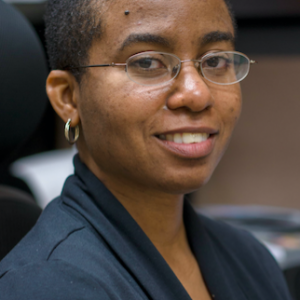Keisha Lindsay, Ph.D.
keishanjeri72@gmail.com
Univerity of Wisconsin-Madison

Country: United States (Wisconsin)
About Me:
Keisha Lindsay is an associate professor in the Departments of Gender & Women's Studies and Political Science at the University of Wisconsin-Madison. She is the recipient of a doctorate in political theory from the University of Chicago, a master's degree in gender and development studies from the University of the West Indies (Jamaica), and an undergraduate degree in political science and black studies from Amherst College. Professor Lindsay has lived and worked in in Jamaica, the Bahamas, Ghana, and the United States. Her research highlights how people throughout the African diaspora interrogate the relationship between race and gender-based oppression in a variety of arenas including public schooling and police brutality. A political theorist by training, her scholarship informs and is informed by intersectionality - an analytical framework that highlights how multiple oppressions inform each other. Her research has been published in a number of scholarly journals including Perspectives on Politics as well as Politics, Groups, and Identities. Her book, In a Classroom of Their Own: The Intersection of Race and Feminist Politics in All-Black Male Schools, was recently published by the University of Illinois Press.
Research Interests
Gender and Politics
Political Theory
Race, Ethnicity and Politics
Education Politics/ Policy
Feminism
Critical Race Theory
Maculinity
Gender And Politics
Countries of Interest
United States
My Research:
Professor Lindsay's research situates the relationship between race and gender at the center of two disciplines - gender and women’s studies and political theory. She does so in order to demonstrate how identity and difference affect distributions of power. Professor Lindsay pays particular attention to how people in the African diaspora articulate their gendered and racialized identifications via popular and scholarly conversations about a range of topics including public schools, gay marriage, black female respectability, and police brutality. Her approach is animated by intersectionality - an analytical framework that highlights how multiple oppressions mutually construct each other.Professor Lindsay’s first book, In a Classroom of Their Own: The Intersection of Race and Feminist Politics in All-Black Male Schools explores the simultaneously anti-racist and patriarchal politics at work in the nationwide effort to establish separate schools for black boys. While intersectionality is traditionally defined as feminist, Professor Lindsay’s research demonstrates how and why black men and other social groups' intersectionally informed claims about their experiences of oppression can be used to support multiple political agendas. Her research also reveals how to foster democratic orientations and coalitions among those groups, including black men and black women, who use intersectionality for diverse political ends.Professor Lindsay is presently writing a second book, Black Ladies and the Art of Resistance: Intellectuals, Athletes, and Beauty Queens, which foregrounds African American and Afro-Jamaican educators, civic leaders, athletes, and entertainers who define themselves as black ladies and who presume that their status as such renders them effective political leaders in the fight against racism. This new book project complicates three key assumptions in much of the feminist literate on traditional gender performance - that racism makes conventional femininity unavailable to black women, that black women who embrace such femininity necessarily perpetuate racism and patriarchy, and that examining white women is the only means of demonstrating the feminist potential of being a “lady.”
Publications:
Books Written:
Many advocates of all-black male schools (ABMSs) argue that these institutions counter black boys’ racist emasculation in white, “overly” female classrooms. In doing so, these advocates simultaneously challenge racism and perpetuate antifeminism. Keisha Lindsay explains the complex politics of ABMSs by situating these schools within broader efforts at neoliberal education reform and within specific conversations about both “endangered” black males and a “boy crisis” in education. Lindsay also demonstrates that intersectionality, long considered feminist, is in fact a politically fluid framework. As such, it represents a potent tool for advancing many political agendas, including those of ABMSs supporters who champion antiracist education for black boys while obscuring black girls’ own race and gender-based oppression in school. Finally, Lindsay theorizes a particular means by which black men and other groups can form antiracist and feminist coalitions even when they make claims about their experiences that threaten bridge building. The way forward, Lindsay shows, allows disadvantaged groups to navigate the racial and gendered politics that divide them in pursuit of productive—and progressive—solutions.